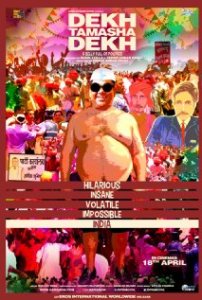A matriarch’s serious illness gives her family occasion to examine their troubled relationships in Tribhanga: Tedhi Medhi Crazy. One big structural flaw hampers this otherwise insightful and well-acted depiction of complicated family dynamics.
Nayan (Tanvi Azmi) is a celebrated author and head of the Apte family. She has a stroke and falls into a coma while dictating her autobiography to her ghost writer, Milan (Kunaal Roy Kapur). Nayan’s daughter Anu (Kajol), a famous and temperamental actress, rushes to Nayan’s bedside with her own adult daughter, Masha (Milthila Palkar).
One of Anu’s first reactions is to joke that at least she won’t have to listen to Nayan talk for a change. Anu and her brother Robindro (Vaibhav Tatwawaadi) don’t try to hide their disdain for their mother just because she’s ill. Nayan made some radical, progressive choices in her life, such as giving her children her own surname following her divorce from their father. However, she never considered the potential negative impacts those choices could have on her kids, nor the price they would pay for her devotion to her writing.
Those hard early years forged an unshakeable alliance between Anu and Robindro and influenced Anu’s own parenting style. Anu and Masha are joined at the hip, but there’s still space for Masha to have her own separate, affectionate relationship with Nayan. Masha seizes upon the opportunity presented by her grandmother’s hospitalization to learn more about the men who were once important in Nayan’s life.
The key man in Nayan’s life at present is Milan, who is the biggest problem in Tribhanga. He’s not a real character so much as a human plot device created to stoke drama and move the story forward. His interactions with the other characters are unnatural, as though Milan has no understanding of human emotions. His awkwardness stands out, given how authentic all of the other characters feel and how well-performed they are, especially by Kajol and Palkar.
Milan — who spends almost as much time in Nayan’s hospital room as Anu — cannot understand why Anu hates her mother. When Anu finally tells him why, her anger seems perfectly justifiable. Milan responds by showing her a video of Nayan addressing the subject matter directly. So Milan already knew the reason, yet still could not understand Anu’s feelings.
Tribhanga is only writer-director Renuka Shahane’s second feature film (her first in Hindi), so maybe relying so heavily on Milan for plot progress is a matter of inexperience. It might also be a matter of not trusting other characters and their actors to more the story forward organically. Instead, Milan interrupts scenes that promise to reveal family history in a more natural, light-hearted way — such as when Anu and Robindro reminisce over their aunt’s delicious ladoos — just to say something dumb that makes Anu mad and cuts the scene short.
In a film about how parental choices affect children, having Milan lurk around the hospital feels like another unwanted choice imposed upon Anu via Nayan and director Shahane. In reality, would anyone want a non-family member whom no one but the comatose patient even likes hanging around in a small hospital room? Other characters could have given Anu insight into her mother’s thoughts just as easily as Milan, especially since the film relies on flashbacks and not just Milan’s interview footage to present Nayan’s side of the story.
The film also stumbles a bit when making comparisons between Anu’s parenting style and Nayan’s, treating some actions as equivalent when they aren’t. Same for comparing Anu’s reaction to her childhood with Masha’s. The film suggests that Masha’s decision to marry into a conservative, patriarchal family as the logical response to being raised by a single mother, as though families only exist in those two forms with nothing in between.
Director Shahane is onto something with Tribhanga. She knows how to write complex women characters and build interesting relationships for them. Trusting in the audience to follow those characters through a story that develops organically is the next step.
Links



